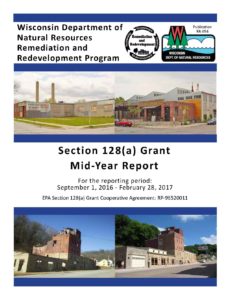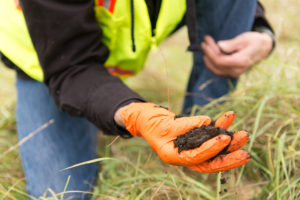On March 27, the Committee on Joint Finance approved the DNR’s request for additional PECFA funds for FY17. The funding will cover the claims already submitted to the RR Program (a backlog of almost $700,000), as well as the claims to be submitted between now and June 30, 2017. The DNR received the funding on April 19 and has begun to pay claims. All back-logged claims should be paid by May 5.
Archives
NR 700 Submittals Now Accepted by Email
The Remediation and Redevelopment (RR) Program is taking steps toward making site file records available electronically via BRRTS on the Web (BOTW).
To assist with this goal, the program encourages consultants to submit NR 700 milestone documents via email to a regional email address and to the project manager instead of submitting a CD or DVD. The RR Program reminds consultants that both electronic and hard copy submittals are required (as well as the fee, if applicable) before submittals are considered “received” by the department. Documents can either be provided as an email attachment or uploaded to the RR Program’s FTP site (if the files are over 12 megabytes). NR 700.11(3g) allows the department to issue this blanket pre-approval for email submittals.
Updated guidance on electronic submittals can be found in Guidance for Electronic Submittals for the Remediation and Redevelopment Program (RR-690) [PDF]
By following the recommendations in the submittal guidance, consultants will help RR staff identify and review documents in a timely manner.
FY 16-17 Remediation and Redevelopment Program 128(a) Mid-Year Report Complete

The DNR submits reports twice a year to EPA on the use of brownfields grant funds to enhance its state response program and to fulfill public record requirements.
The RR Program’s mid-year report to the EPA, which details outputs and outcomes funded by a federal grant, is now available for review. The Section 128(a) Grant Mid-Year Report, for the reporting period of September 1, 2016 to February 28, 2017, highlights work completed in the first half of the funding year.
Since 2003, the RR Program has consistently and efficiently used these funds under a cooperative agreement with the EPA to enhance state efforts with brownfields cleanup and redevelopment. Previous reports can be found on the Brownfields Program web page.
New Guidance Documents Now Available on Managing Contaminated Soil and other Wastes
The RR Program recently finalized four new guidance documents regarding the management of contaminated soil and other waste materials excavated at sites or facilities in locations other than a licensed landfill.
This guidance is the culmination of several years of discussion between the RR Program and external stakeholders, including more than 20 individuals who served on the program’s Contaminated Materials Management Advisory Group and other interested parties who also participated in meetings. The group was formed in May 2015 and met more than a dozen times to provide input on issues related to materials management. The RR Program thanks those who participated for sharing their time and perspective.
These new guidance documents include:
- RR-060, Management of Contaminated Soil and Other Solid Wastes Wis. Admin. Code §§ NR 718.12 and NR 718.15, provides a general overview of the exemptions available under NR 718 for managing excavated material, a description of when these exemptions may apply, and a summary of the application process and requirements.
- RR-071, NR 718.12 Sample Results Notification, provides a cover page that may be used when submitting laboratory reports to the DNR to satisfy the requirements of NR 718.12(1)(e)(4).
- RR-072, Recommended Format for Exemption Request Wis. Admin Code NR 718.12 or NR 718.15, provides a consistent format to demonstrate that the proposed management of solid waste material, as a remedial or interim action, qualifies for a NR 718.12 or NR 718.15 exemption and to request written approval of the exemption from the DNR.
- RR-073, Request for Exemption from Location Criteria of NR 718.12(1)(c) for Managing Soil as an Immediate Action, provides a format to request that the DNR allow management of soil, as an immediate action, in an area that will not comply with the location criteria listed in NR 718.12(1)(c).
Contact Paul Grittner at (608) 266-0941 or paul.grittner@wisconsin.gov regarding questions related to these documents.
Free Webinar: Brownfields Financing Webinar Series – Financing Brownfields with Private Activity Bonds (PABs)
As part of CDFA’s Brownfields Technical Assistance Program, the Brownfield Financing Webinar Series will include three 90-minute webinars over the year and will focus on effective use of brownfields and redevelopment financing tools, while highlighting best practices, case studies, and CDFA’s technical assistance program participants. This series is designed for professionals who work directly with brownfield sites as well as economic development professionals and communities interested in shaping programs to enhance redevelopment financing opportunities.
The latest webinar of this series discusses the use of Private Activity Bonds (PABs) for brownfield redevelopment projects and how communities can use PABs strategically and in combination with other financing tools.
PECFA Reimbursement Reminders
180 Days to Submit Claims
Claimants and consultants planning to seek reimbursement for costs incurred on PECFA-eligible projects are reminded that they have only 180 days from the day the expense was incurred to submit the claim to the Department. There is no extension on that deadline. If you hand-deliver a claim, please make sure to get a date stamp from the Department staff receiving the claim. In addition to the date it was hand delivered and date stamped, the Department will also consider the date of submittal to the Department to be the date it’s emailed, faxed or postmarked.
IRS Form 1099
PECFA applicants and/or claimants will receive a Form 1099-G from the Wisconsin Department of Revenue each year they receive a reimbursement. However, they do not have to pay taxes on PECFA reimbursement money. Although a taxpayer is not required to disclose the fact that an amount is being excluded from income on their return, the Form 1099-G is provided to the IRS. Therefore, it is in the taxpayer’s interest to include language on the return to explain the purpose of the reimbursement and how the amount is treated for tax purposes, making correspondence and/or invoices from the IRS less likely. Consultants and PECFA agents should provide this information to applicants/claimants.
Here’s an example of an applicable disclosure statement: “In (year) I received payments from the Wisconsin PECFA fund in the amount of $(amount). This payment is a reimbursement for costs incurred for environmental cleanup of gas/oil spill on my property. The $(amount) is excludable under Internal Revenue Code Section 126.”
Oshkosh, Stoughton Brownfields to Benefit from Wisconsin Assessment Monies (WAM) Awards

WAM awards help investigate contamination at closed or closing industrial plants.
Two Wisconsin communities will benefit from WAM awards to help investigate contamination at two former manufacturing properties, soon destined for new life.
In Oshkosh, the Housing Authority seeks to convert the former Waite Grass Rug Factory into new housing, parking, daycare and office space. In Stoughton, the Stoughton Redevelopment Authority wants to clean up the former Millfab Holley Moulding property, getting that site ready for redevelopment.
Read the full press release.
Free Webinar – Leveraging Resources for Brownfields Revitalization: Meet the Funders – Parks, Community Health, and the Arts February 28, 2017
Brownfield grants from the U.S. Environmental Protection Agency (EPA) are one of many sources of funds that can support redevelopment of contaminated sites. This webinar will highlight a number of redevelopment resources available from the National Park Service (NPS), The Department of Health and Human Services (HHS), and the National Endowment for the Arts (NEA) to leverage your brownfield dollars.
The webinar will also feature a presentation from a community that has successfully used grants, loans and other support from these agencies for its revitalization efforts. It is the fourth in OBLR’s webinar series on what communities need to know to successfully leverage resources for brownfields revitalization. Register online.
2017 Issues & Trends Schedule
The RR Program’s popular conference call and Skype-based training series, Issues & Trends, continues in 2017 and the year’s full schedule can be viewed in the Program’s Training Library web page, along with presentations from previous events.
Please note that the schedule is subject to change. Visit the Program’s Conference and Training web page for the latest information. Questions about any of the upcoming events can be sent to DNRRRComments@wisconsin.gov.
